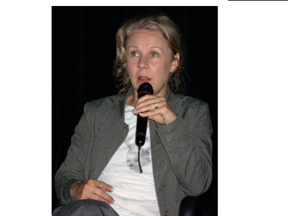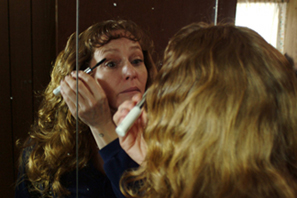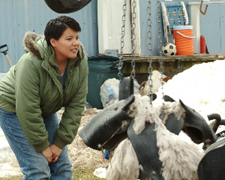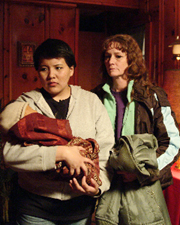The Alliance of Women Film Journalists held a screening this week of Frozen River, which opens on August 1st. Their stated mission is to "support work by and about women (both in front of and behind the cameras) to assure that women's perceptions about film are represented in the media." The evening was capped by
a Q & A with director Courtney Hunt and featured actress Melissa Leo.
During the summer stretch, most studios push movies featuring comedy, adventure escapism, or musical light fare. Sony Pictures Classics has chosen to release a grown-up movie showcasing two women in the leads, its own brand of action, and rich multi-layered content. Tom Bernard, co-president and co-founder of Sony Pictures Classics, told me that a conscious decision had been made to distribute Frozen River in August during the height of the "summer schlock." He explained, "Smart movies like Frozen River are an alternative." Bernard foresees several target audiences for the film including the over-40 demographic, women, Native Americans, and Sundance aficionados. While other studios are focused on Monday's box office stats, Bernard said, "We never try to win the weekend... we try to win the war."
Frozen River began its genesis in 2004 as a short film. This year, it won the Grand Jury Prize for Best Film Drama at the Sundance Film Festival. Hunt spoke about the "sisterhood that was forged" between herself and Leo as she worked to get the project to the next step. "I knew it would be a hard sale," Hunt said, but what she had in hand was a "real commitment" from Leo to the material.

The plot revolves around the relationship that develops between an upstate New York "trailer-mom," Ray Eddy (Melissa Leo), and a young Mohawk woman, Lila Littlewolf (Misty Upham), who lives on a reservation that straddles the United States-Canadian border. The women become unlikely partners in smuggling illegal immigrants across the frozen St. Lawrence River. Ray's Dodge Spirit, which has a large truck and a pop-lock, becomes the vehicle for a business venture that is portrayed in a series of nail-biting runs. These sequences clearly position
Frozen River in the thriller genre.

Leo, who is known for her gritty and down-to-earth portrayals (she played Detective Kay Howard in Homicide: Life on the Streets from 1993-1997), gets under the skin of her character. By turns both tough and vulnerable, we watch her traverse psychological territory from rejection, loss, and callous determination to fortitude, integrity, and ultimately -- emotional rebirth. We observe her in all of her personifications. A wife abandoned by her husband (a gambling addict who absconds with the down-payment for their new "doublewide" trailer); a woman applying mascara to a tear stained face; the "Dollar Value" employee in a dead-end job who gets passed over, while the nubile clerk with the strategically placed tattoo gets all the favors; the loving mom who feeds her kids Tang and popcorn while trying to stay one step ahead of her creditors.

Her counterpart, Lila, has her own laundry list of troubles.

Her husband drowned when the ice gave way during a smuggling job; her mother-in-law forcibly took her baby (now a year old) immediately after its birth; she is an outsider within her Native American community. Her vision problems, which are later rectified with a pair of glasses, serve as a metaphor for her evolution to clarity. The dynamic between the pair shifts from mistrust and a conspiracy of necessity, to understanding and a true connection. When I spoke to Leo about the tie between the two women, she qualified it as "a bond that Ray stumbles into."
Upham's characterization gives voice to the numerous issues facing Native Americans in what was referenced by Hunt as "an unspoken situation." Lila tells Ray, "I don't usually work with whites." While they are driving with their illicit cargo, Ray's anxiety mounts as they pass a state trooper. Lila reassures her with more than a tinge of resentment and disdain, "They're not going to stop you. You're white."
There are parallels and subtexts throughout the film that underscore the conflicts and behaviors of the primary characters. Ray's 15-year-old son, who protects and nurtures his 5-year-old brother, scams a senior Native American woman to get some cash to buy a coveted gift to place under the Christmas tree for his sibling. Ray gains insight and empathy toward Lila when she learns about the loss of her infant. Both women connect with a Pakistani immigrant mother when the maternal drive unites them in an experience that defines the concept of renewed hope.

The film was shot in below-zero weather in Plattsburgh, New York. The greyish blue palette
from the harsh light, combined with the expanses of ice and snow, reflect the cold bleakness of the personal struggles of Ray and Lila.
There is already Oscar buzz surrounding Leo's performance. When I asked Hunt if she was concerned about the movie being marginalized because it featured two women in the leads she responded, "A good story is a good story." It should be noted that a women-driven script is not automatically synonymous with a chick flick. Hunt said to me, "There are unheralded stories that I think are heroic and movie worthy." This echoes what she wrote in her Director's statement: "...a mother's instinct to protect her children is more powerful than any cultural, political, or economic boundary line. Ray and Lila embodied the unheralded struggle of single mothers of all ethnicities who are living on the edge." During the Q &A, Hunt said, "To be somebody's mother can give you strength."
How much more universal can you get?
The film opens on August 1st in seven theaters nationwide, and will
roll out until the last week of September.
Film stills courtesy of Sony Classics Pictures
